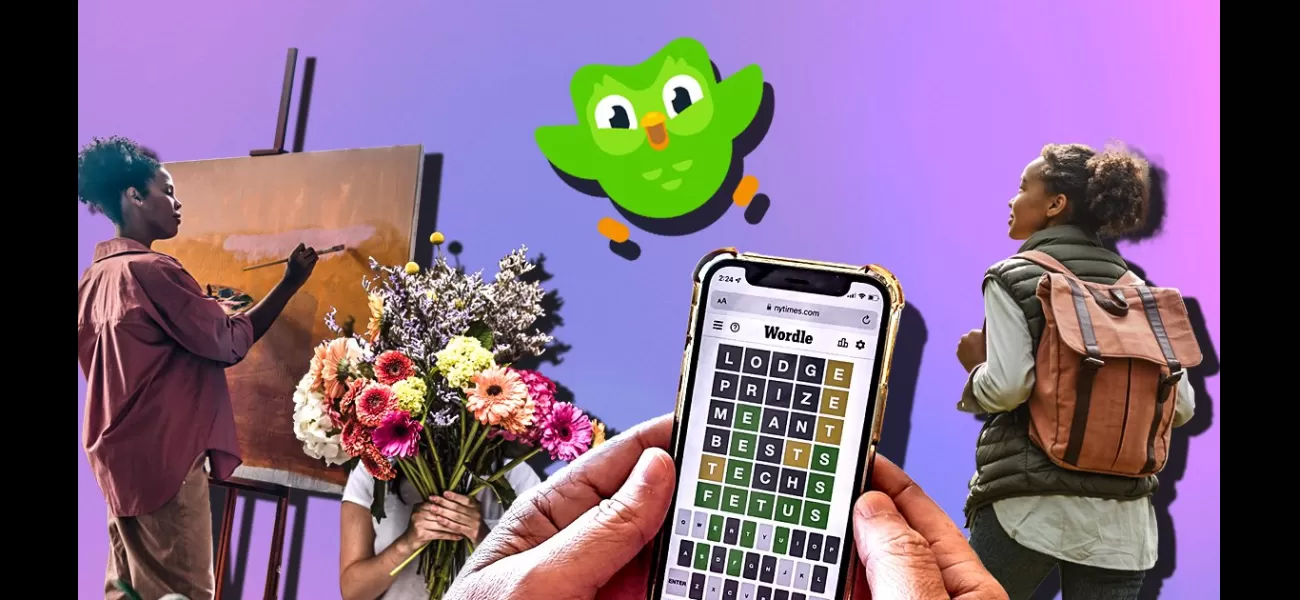People are still playing Wordle in 2024.
People can't stop indulging in their hobbies during the lockdown, from going on walks to picking up new activities typically associated with girls.
May 1st 2024.

As we approach the summer of 2024, our minds are filled with images of foreign vacations, large family barbecues, and the inevitable hangovers after attending Glastonbury. With our schedules bursting at the seams, it's hard to imagine that not too long ago, our summer plans consisted of doing absolutely nothing. But in the midst of the lockdown, we all found ourselves searching for new hobbies to pass the time and make those long days go by a little quicker.
In 2022, a survey of 2,000 adults revealed that 59% of them had picked up a new hobby during the lockdown. Baking, gardening, and photography were among the most popular choices. And while we are now thankfully free from the restrictions of the pandemic, our obsession with having extracurricular activities to fill our days has only intensified.
Earlier this year, "girl hobbies" became a viral trend on TikTok. Creator Lo Birch's video, which has garnered a whopping 4.5 million views, offered suggestions like "skincare routines" and "hot girl walks," reminiscent of the activities that were popular during the lockdowns of 2020. And according to Sport England, the number of people going for leisurely walks, which saw a surge during the lockdowns, remains higher than it was before the pandemic.
But it's not just daily walks that have become a part of our routines. The New York Times, known for its news coverage, has also found success with its gaming offerings. As one Times staffer joked with Vanity Fair, the newspaper has now become a gaming company that also happens to provide news. And let's not forget the ever-popular Duolingo app, which has seen a significant increase in subscribers since the start of the pandemic.
It seems that the lockdown reminded us of the benefits of having a hobby outside of socializing with friends. Not only does it keep us physically active, but it also has a positive impact on our mental health. According to psychologist Emma Kenny, our hobbies act as a "psychological anchor to comfort." In a time when everything felt uncertain, having control over something as simple as completing a daily language lesson on Duolingo gave us a sense of stability.
And now, even as life begins to return to normal, we hold onto these hobbies as a reminder of the control we have over our own lives. Why give up something that brings us joy? As Emma says, "when you find something you really enjoy, why would you give it up?"
Here, we hear from women who have found solace in their pandemic hobbies and continue to enjoy them today. For Darcey, a full-time midwife during the lockdown, the Duolingo app became a part of her daily routine. Amidst the chaos of the pandemic, spending 15 to 20 minutes a day learning French provided her with a sense of focus and motivation. And now, the app holds a special place in her heart as it reminds her of the happy memories she shared with her granddaughter during the lockdown.
Similarly, Georgia, who wasn't particularly active before the pandemic, found herself going for daily walks during the lockdown. She soon discovered that these walks not only helped her stay physically active but also had a positive impact on her mental health. And she has continued this habit even after returning to the city, prioritizing her well-being by joining a gym to ensure she stays active even on rainy days.
Walking therapist Carmen Rendell shares the mental health benefits of walking, including quieting our nervous system and creating space for unconscious exploration. It's no wonder that so many of us have turned to this simple activity during the lockdown and continue to incorporate it into our daily routines.
So as we move forward and find our way back to some semblance of normalcy, let's not forget the lessons we learned during the lockdown. Let's hold onto our hobbies, our "psychological anchors to comfort," and continue to prioritize our physical and mental well-being. After all, as Darcey and Georgia have shown us, these hobbies can bring us joy and remind us of the resilience we have shown during these uncertain times.
As summer of 2024 approaches, we are all eagerly anticipating the end of Covid restrictions and looking forward to a summer filled with foreign vacations, family gatherings, and maybe a few post-Glastonbury hangovers. Our calendars are packed with exciting plans, making it hard to believe that not too long ago, our summer activities consisted of absolutely nothing. During the lockdown days, many of us found ourselves with an abundance of free time and took up new hobbies to make the days go by faster.
In 2022, a survey of 2,000 adults revealed that 59% of them had picked up a new hobby during lockdown. Baking, gardening, and photography were among the most popular choices. However, even now, as we no longer have to abide by Covid restrictions, we seem to be more obsessed than ever with finding ways to fill our time. Earlier this year, "girl hobbies" became a viral trend on TikTok. In one of the most popular videos by creator Lo Birch, with a whopping 4.5 million views, she suggested activities such as "doing skincare" and "hot girl walks" reminiscent of the lockdown days.
Despite the lifting of restrictions, many people are still choosing to spend their leisure time walking. According to recent figures from Sport England, the number of people walking for leisure, which surged during lockdown, remains higher than before. And it's not just short walks around the neighborhood; people are also engaging in activities like gaming and language learning through apps like Wordle and Duolingo, respectively.
It seems that the pandemic has reminded us of the importance of having hobbies outside of socializing with friends. These activities not only have physical and mental health benefits but also serve as a psychological anchor to comfort. As psychologist Emma Kenny explains, during uncertain times, having a sense of control over our environment, even through something as simple as daily Duolingo lessons, can be incredibly reassuring.
And it's no surprise that we are holding onto these hobbies even as life slowly returns to normal. As Emma says, "when you find something you really enjoy, why would you give it up?" We spoke to several women about their pandemic hobbies that continue to bring them joy today.
For 50-year-old Darcey, learning French through Duolingo was a daily routine during lockdown. As a full-time midwife, she found solace in the simplicity of spending 15-20 minutes a day on the app. And now, when she forgets to practice, her granddaughter reminds her by saying "owl" (her cute way of saying "Duolingo") and jumping on her lap to watch her learn.
Similarly, Georgia, who wasn't particularly active before the pandemic, found solace in daily walks during lockdown. And even now, she prioritizes staying active, whether it's going for walks with friends or exploring new places on holiday. She even joined a gym to continue her fitness routine on days when the weather doesn't permit outdoor activities.
Walking therapist Carmen Rendell believes that walking has numerous mental health benefits, including calming the nervous system and allowing for unconscious exploration. And with the added bonus of physical exercise, it's no wonder that many people have continued with their walking routine post-pandemic.
In conclusion, the pandemic may have reminded us of the importance of having hobbies and activities that bring us joy and comfort during uncertain times. And as we slowly transition into a post-Covid world, it seems these hobbies have become a permanent part of our lives.
In 2022, a survey of 2,000 adults revealed that 59% of them had picked up a new hobby during the lockdown. Baking, gardening, and photography were among the most popular choices. And while we are now thankfully free from the restrictions of the pandemic, our obsession with having extracurricular activities to fill our days has only intensified.
Earlier this year, "girl hobbies" became a viral trend on TikTok. Creator Lo Birch's video, which has garnered a whopping 4.5 million views, offered suggestions like "skincare routines" and "hot girl walks," reminiscent of the activities that were popular during the lockdowns of 2020. And according to Sport England, the number of people going for leisurely walks, which saw a surge during the lockdowns, remains higher than it was before the pandemic.
But it's not just daily walks that have become a part of our routines. The New York Times, known for its news coverage, has also found success with its gaming offerings. As one Times staffer joked with Vanity Fair, the newspaper has now become a gaming company that also happens to provide news. And let's not forget the ever-popular Duolingo app, which has seen a significant increase in subscribers since the start of the pandemic.
It seems that the lockdown reminded us of the benefits of having a hobby outside of socializing with friends. Not only does it keep us physically active, but it also has a positive impact on our mental health. According to psychologist Emma Kenny, our hobbies act as a "psychological anchor to comfort." In a time when everything felt uncertain, having control over something as simple as completing a daily language lesson on Duolingo gave us a sense of stability.
And now, even as life begins to return to normal, we hold onto these hobbies as a reminder of the control we have over our own lives. Why give up something that brings us joy? As Emma says, "when you find something you really enjoy, why would you give it up?"
Here, we hear from women who have found solace in their pandemic hobbies and continue to enjoy them today. For Darcey, a full-time midwife during the lockdown, the Duolingo app became a part of her daily routine. Amidst the chaos of the pandemic, spending 15 to 20 minutes a day learning French provided her with a sense of focus and motivation. And now, the app holds a special place in her heart as it reminds her of the happy memories she shared with her granddaughter during the lockdown.
Similarly, Georgia, who wasn't particularly active before the pandemic, found herself going for daily walks during the lockdown. She soon discovered that these walks not only helped her stay physically active but also had a positive impact on her mental health. And she has continued this habit even after returning to the city, prioritizing her well-being by joining a gym to ensure she stays active even on rainy days.
Walking therapist Carmen Rendell shares the mental health benefits of walking, including quieting our nervous system and creating space for unconscious exploration. It's no wonder that so many of us have turned to this simple activity during the lockdown and continue to incorporate it into our daily routines.
So as we move forward and find our way back to some semblance of normalcy, let's not forget the lessons we learned during the lockdown. Let's hold onto our hobbies, our "psychological anchors to comfort," and continue to prioritize our physical and mental well-being. After all, as Darcey and Georgia have shown us, these hobbies can bring us joy and remind us of the resilience we have shown during these uncertain times.
As summer of 2024 approaches, we are all eagerly anticipating the end of Covid restrictions and looking forward to a summer filled with foreign vacations, family gatherings, and maybe a few post-Glastonbury hangovers. Our calendars are packed with exciting plans, making it hard to believe that not too long ago, our summer activities consisted of absolutely nothing. During the lockdown days, many of us found ourselves with an abundance of free time and took up new hobbies to make the days go by faster.
In 2022, a survey of 2,000 adults revealed that 59% of them had picked up a new hobby during lockdown. Baking, gardening, and photography were among the most popular choices. However, even now, as we no longer have to abide by Covid restrictions, we seem to be more obsessed than ever with finding ways to fill our time. Earlier this year, "girl hobbies" became a viral trend on TikTok. In one of the most popular videos by creator Lo Birch, with a whopping 4.5 million views, she suggested activities such as "doing skincare" and "hot girl walks" reminiscent of the lockdown days.
Despite the lifting of restrictions, many people are still choosing to spend their leisure time walking. According to recent figures from Sport England, the number of people walking for leisure, which surged during lockdown, remains higher than before. And it's not just short walks around the neighborhood; people are also engaging in activities like gaming and language learning through apps like Wordle and Duolingo, respectively.
It seems that the pandemic has reminded us of the importance of having hobbies outside of socializing with friends. These activities not only have physical and mental health benefits but also serve as a psychological anchor to comfort. As psychologist Emma Kenny explains, during uncertain times, having a sense of control over our environment, even through something as simple as daily Duolingo lessons, can be incredibly reassuring.
And it's no surprise that we are holding onto these hobbies even as life slowly returns to normal. As Emma says, "when you find something you really enjoy, why would you give it up?" We spoke to several women about their pandemic hobbies that continue to bring them joy today.
For 50-year-old Darcey, learning French through Duolingo was a daily routine during lockdown. As a full-time midwife, she found solace in the simplicity of spending 15-20 minutes a day on the app. And now, when she forgets to practice, her granddaughter reminds her by saying "owl" (her cute way of saying "Duolingo") and jumping on her lap to watch her learn.
Similarly, Georgia, who wasn't particularly active before the pandemic, found solace in daily walks during lockdown. And even now, she prioritizes staying active, whether it's going for walks with friends or exploring new places on holiday. She even joined a gym to continue her fitness routine on days when the weather doesn't permit outdoor activities.
Walking therapist Carmen Rendell believes that walking has numerous mental health benefits, including calming the nervous system and allowing for unconscious exploration. And with the added bonus of physical exercise, it's no wonder that many people have continued with their walking routine post-pandemic.
In conclusion, the pandemic may have reminded us of the importance of having hobbies and activities that bring us joy and comfort during uncertain times. And as we slowly transition into a post-Covid world, it seems these hobbies have become a permanent part of our lives.
[This article has been trending online recently and has been generated with AI. Your feed is customized.]
[Generative AI is experimental.]
0
0
Submit Comment





